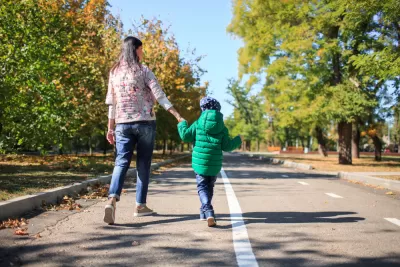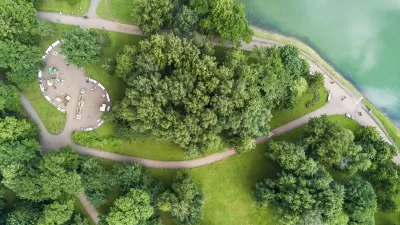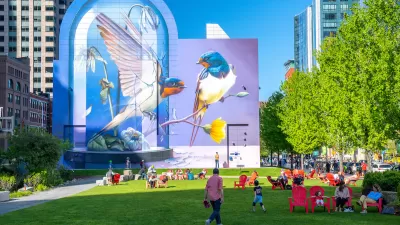A new study by researchers in Virginia found that walking in a quiet urban setting with shade and greenery can significantly improve mood and reduce stress.

If you are taking walks to de-stress, where you do it matters. A new study by researchers from the Science Museum of Virginia, Virginia Commonwealth University, University of Virginia and Virginia Tech found that walking in a quiet urban setting with shade and greenery can significantly improve mood and reduce stress, while walking in a noisier urban setting without shade and plants or green space can increase exposure to heat, air pollution and traffic noise, thereby increasing stress levels and heat-related discomfort.
As reported by Mary Kate Brogan, the study, “The Impact of Urban Walking on Psychophysiological Well-Being,” published in Cities & Health in September 2022, suggests that environment matters when exercising for mental health and supports a growing body of evidence that planning urban environments to incorporate green space can improve residents’ overall health.
This study builds on research in older adults extending the protocol to healthy adults exploring the impacts of walking in varying environmental conditions on psychophysiological outcomes (mood, working-memory and heart rate variability (HRV)). Participants undertook a 20 to 30-minute walk in both an urban green and gray setting, one week apart, with varying levels of air pollution and heat. Walking in the urban green setting increased positive mood and HRV and decreased self-reported stress and arousal. Thermal sensation in the urban green setting was lower compared to the urban gray setting.
The results of the study build on evidence that there are potential beneficial effects of urban green settings with respect to heat and particulate matter (PM2.5). These results show psychophysiological benefits of short walks within urban green settings, during the COVID-19 pandemic, which has implications for public health and how people engage with our local environments for physical activity.
For more information, please read the source article.
FULL STORY: Walking in urban green spaces is better for us than walking in gray spaces

Maui's Vacation Rental Debate Turns Ugly
Verbal attacks, misinformation campaigns and fistfights plague a high-stakes debate to convert thousands of vacation rentals into long-term housing.

Planetizen Federal Action Tracker
A weekly monitor of how Trump’s orders and actions are impacting planners and planning in America.

In Urban Planning, AI Prompting Could be the New Design Thinking
Creativity has long been key to great urban design. What if we see AI as our new creative partner?

Florida Seniors Face Rising Homelessness Risk
High housing costs are pushing more seniors, many of them on a fixed income, into homelessness.

Massachusetts Budget Helps Close MBTA Budget Gap
The budget signed by Gov. Maura Healey includes $470 million in MBTA funding for the next fiscal year.

Milwaukee Launches Vision Zero Plan
Seven years after the city signed its Complete Streets Policy, the city is doubling down on its efforts to eliminate traffic deaths.
Urban Design for Planners 1: Software Tools
This six-course series explores essential urban design concepts using open source software and equips planners with the tools they need to participate fully in the urban design process.
Planning for Universal Design
Learn the tools for implementing Universal Design in planning regulations.
Gallatin County Department of Planning & Community Development
Heyer Gruel & Associates PA
JM Goldson LLC
City of Camden Redevelopment Agency
City of Astoria
Transportation Research & Education Center (TREC) at Portland State University
Jefferson Parish Government
Camden Redevelopment Agency
City of Claremont





























